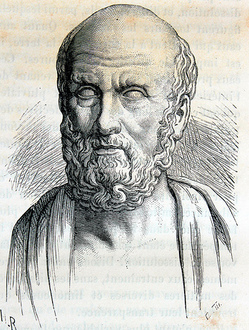Candid Cancer: Understanding the language of medicine

The language of medicine started with Hippocrates.
El Bibliomata
When I was diagnosed, nobody said, "You have cancer. And oh, by the way, here's a glossary of new words you'll have to learn." As if I weren't panicked enough at facing a life-threatening illness, the incomprehensible words that I was hearing and reading only compounded my fear and confusion. No wonder I felt unequipped to make reasonably informed decisions that needed to be made.
And there were lots of incomprehensible words. For example, my earliest CT report referred to "bilateral inguinal lymphadenopathy." I figured that bilateral meant both sides and that lymphadenopathy might be swelling of some kind, but inguinal? What the heck was that? A good dictionary informed me that it is an adjective describing something in the groin region and that it originates from the Latin word "inguinalis," meaning groin. Geez, why couldn't somebody just say that the nodes in my groin area were swollen on both sides? How hard would that be?
If I was supposed to be impressed by big words, I wasn't. On the contrary, I was frustrated that I had to spend hours pouring through medical dictionaries just to understand what was happening — and where — in my body, and I complained to my husband Alex that Medicalese, as I called it, might as well be Greek.
Well, it is. Partly. The language of medicine is mostly based on Greek and Latin words. Medicalese began more than two thousand years ago when the Greek physician Hippocrates (c. 460 - c. 377 BC) coined the word carcinoma, from the Greek word "karkinos," meaning crab, and the suffix "-oma," meaning growth. He used the word to describe ulcer-forming tumors and chose "karkinos" because the tumors resembled the form of a crab. Years later, the Roman physician Celsus (28-50 BC) translated the Greek term into cancer, the Latin word for crab. By the beginning of the 19th century, carcinoma was synonymous for cancer.
And Galen, another Roman physician, used the Greek word "oncos," meaning tumor, to describe — what else? — tumors. Eventually, we got oncology and oncologists.
Hence, Medicalese started so long ago that it's unlikely to morph into something we can easily understand. Alas, it will only add more incomprehensible words to its lexicon, but that doesn't mean we can't master it. We can. And learning it doesn't have to be as hard as I made it in the beginning when I spent more time griping than grasping. In my own defense, I was initially too paralyzed to absorb anything, but it didn't take long to figure out that knowing the jargon makes navigating through Cancer Land a lot easier, and it helped me feel less like a victim and more in control of my own destiny.
So how do we learn it? One word at a time. The National Institutes of Health has an excellent online medical dictionary with easy-to-understand definitions of any medical term.
Additionally, doctors know that we're not fluent in their language. I've found that some are better than others at translating Medicalese into plain English, but most will do their best if we ask. I've even asked doctors to draw me a picture and have yet to be refused. And a well known "secret" among those of us who've had cancer is that nurses are excellent translators. The point is, when we have a devastating illness like cancer, it's not the time to be shy about asking for translations — once, twice or however many times it takes.
All too well, I know that having cancer and learning a new language at the same time feels daunting, even intimidating, but take it from me: it really is possible, even lacking a medical background. And understanding Medicalese helps us make informed choices and participate in our care, which can improve the quality of our lives. Isn't that enough of a reason to start translating those 36-syllable words you never wanted to know?
Next Friday, February 4: Know Thy Pathologist
Previous installments of Candid Cancer are archived here.
Betsy de Parry is the author of The Roller Coaster Chronicles, a book about her experience with cancer and the shorter, serialized version she wrote for annarbor.com. Find her on Facebook or email her.

